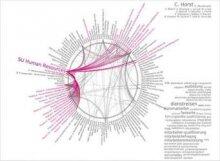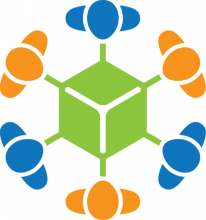Using data from a novel laboratory experiment on complex problem solving in which we varied the structure of 16-person networks, we investigate how an organization’s network structure shapes the performance of problem-solving tasks. Problem solving, we argue, involves both exploration for information and exploration for solutions. Our results show that network clustering has opposite effects for these two important and complementary forms of exploration. Dense clustering encourages members of a network to generate more diverse information but discourages them from generating diverse theories; that is, clustering promotes exploration in information space but decreases exploration in solution space. Previous research, generally focusing on only one of those two spaces at a time, has produced an inconsistent understanding of the value of network clustering. By adopting an experimental platform on which information was measured separately from solutions, we bring disparate results under a single theoretical roof and clarify the effects of network clustering on problem-solving behavior and performance. The finding both provides a sharper tool for structuring organizations for knowledge work and reveals challenges inherent in manipulating network structure to enhance performance, as the communication structure that helps one determinant of successful problem solving may harm the other.
- Home
- Collective Cognition
Collective Cognition
Search is a ubiquitous property of life. Although diverse domains have worked on search problems largely in isolation, recent trends across disciplines indicate that the formal properties of these problems share similar structures and, often, similar solutions. Moreover, internal search (e.g., memory search) shows similar characteristics to external search (e.g., spatial foraging), including shared neural mechanisms consistent with a common evolutionary origin across species. Search problems and their solutions also scale from individuals to societies, underlying and constraining problem solving, memory, information search, and scientific and cultural innovation. In summary, search represents a core feature of cognition, with a vast influence on its evolution and processes across contexts and requiring input from multiple domains to understand its implications and scope.
Experimental research in traditional laboratories comes at a significant logistic and financial cost while drawing data from demographically narrow populations. The growth of online methods of research has resulted in effective means for social psychologists to collect large-scale survey-based data in a cost-effective and timely manner. However, the same advancement has not occurred for social psychologists who rely on experimentation as their primary method of data collection. The aim of this article is to provide an overview of one online laboratory for conducting experiments, Volunteer Science, and report the results of six studies that test canonical behaviors commonly captured in social psychological experiments. Our results show that the online laboratory is capable of performing a variety of studies with large numbers of diverse volunteers. We advocate for the use of the online laboratory as a valid and cost-effective way to perform social psychological experiments with large numbers of diverse subjects.
People influence each other when they interact to solve problems. Such social influence introduces both benefits (higher average solution quality due to exploitation of existing answers through social learning) and costs (lower maximum solution quality due to a reduction in individual exploration for novel answers) relative to independent problem solving. In contrast to prior work, which has focused on how the presence and network structure of social influence affect performance, here we investigate the effects of time. We show that when social influence is intermittent it provides the benefits of constant social influence without the costs. Human subjects solved the canonical traveling salesperson problem in groups of three, randomized into treatments with constant social influence, intermittent social influence, or no social influence. Groups in the intermittent social-influence treatment found the optimum solution frequently (like groups without influence) but had a high mean performance (like groups with constant influence); they learned from each other, while maintaining a high level of exploration. Solutions improved most on rounds with social influence after a period of separation. We also show that storing subjects’ best solutions so that they could be reloaded and possibly modified in subsequent rounds - a ubiquitous feature of personal productivity software - is simiar to constant social influence: It increases mean performance but decreases exploration.
Volunteer Science is an online platform enabling anyone to participate in social science research. The goal of Volunteer Science is to build a thriving community of research participants and social science researchers for Massively Open Online Social Experiments ("MOOSEs"). The architecture of Volunteer Science has been built to be open to researchers, transparent to participants, and to facilitate the levels of concurrency needed for large scale social experiments. Since then, 14 experiments and 12 survey-based interventions have been developed and deployed, with subjects largely being recruited through paid advertising, word of mouth, social media, research, and Mechanical Turk. We are currently replicating several forms of social research to validate the platform, working with new collaborators, and developing new experiments. Moving forward our priorities are continuing to grow our user base, developing quality control processes and collaborators, diversifying our funding models, and creating novel research.




